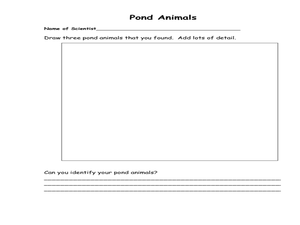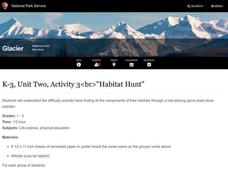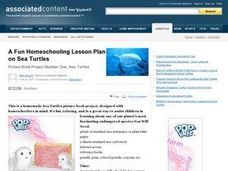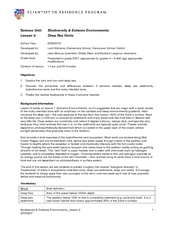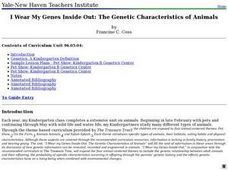Curated OER
What If We Run Out?
Students explore the consequences of shrinking habitats and the human impact on wildlife populations. They participate in a game to study the consequences and describe the preservation of animal habitats.
Curated OER
Mini-Ecosystems
Third graders identify the living and non living things in a book read aloud and discuss the interactions represented in the book. Then, they research and include a list of food that each animal needs in an ecosystem. Finally, 3rd...
Curated OER
Habitats and Adaptations
Students research and describe the habitat and adaptations of a reef animal. After the student is assigned a habitat, they design and draw a cresture adapted to eat each food and to live in each habitat.
Curated OER
Freshwater Habitats
Students take samples from local freshwater sources and examine them for macroinvertebrate life. They take samples from both shallow and deep freshwater environments, measure temperatures, and classify organisms found in their samples.
Curated OER
Different Environments
Pupils read literature selection, discuss habitat, divide habitats into different categories such as water, soil, and land, list animals that live in each habitat, and describe habitats using descriptive words in vocabulary list.
Curated OER
Habitat for Sale
Learners are able to define habitat, and identify the four things that living things need to survive. They are able to describe how living things are adapted to their habitats.
Curated OER
Threatened, Endangered & Extinct Lesson Plan
Pupils examine the basic needs of living organisms. In this science lesson, students study ecosystems and discover that organisms have basic needs that must be met.
Curated OER
Oh No! Oil Spills
Students discover the threats of an oil spill. In this ecological awareness instructional activity, students examine the effects of oil spills on animals and our oceans. Students get simulated oil on themselves and discover ways to...
Curated OER
Pond and Pond Organisms
Students explore pond ecosystems. In this pond organism activity, students will use pond water and a plastic bad in order to locate and identify freshwater organisms. The activity is designed for younger grades, but includes an...
Curated OER
Habitat Hopscotch
Students analyze different habitats. In this habitat instructional activity, students evaluate what animals need in their habitats. Students participate in the game Habitat Hopscotch.
Curated OER
The Salamander Room
Students examine how each animal's habitat provides what that animal needs for survival. They discuss what an animal needs to survive-food, shelter, water, and space.
University of South Carolina
Home Sweet Home
Fifth graders will research a biome (land or aquatic) and create a project (diorama, model or another idea of the student's choosing) which includes the geographic features of that biome as well as plants and animals found there and...
Curated OER
Habitat Hunt
Learners discover how hard it is for animals to find all the items needed in their habitat. In this habitat lesson, students play a game in which they pretend to be an animal, they discover that not all animals can find the food needed...
Curated OER
A Natural Habitat: What, How and Why
Students understand what a habitat is. They determine why a habitat is important to our environment no matter where it is located. Students observe and recognize natural habitats in their surroundings.
Curated OER
Animal Movements
Students discuss the behavior of different animals and how they move. They explore the ways that this helps them live and find food in their environment. They participate in a game that requires them to mimic the ways in which animals move.
Curated OER
Habitat Lap Sit
Students examine through role play interdependence of animal and man in their search for the proper arrangement of food, water, shelter and space in the same regions. Students then discuss necessary components of suitable habitat.
Curated OER
Homeschooling Lesson: Sea Turtles
Students write down the names of common turtles and observe pictures of various types. In this sea turtles activity, students review names and features of these animals, label and draw a picture. Students research habitat, migration,...
Curated OER
Penguins Around the World
Students investigate penguins. In this Science instructional activity, students compare and contrast penguins to flying birds. Students use a Venn diagram to illustrate the differences and similarities of penguins and flying birds.
Curated OER
Specialized for the Sea
Students use pictures and make a mural to investigate how ocean animals are adapted to certain parts of their environment.
Curated OER
Deep Sea Vents
Learners study the vent and non vent deep sea and see the differences in habitats. In this investigative lesson students complete a worksheet and work in groups.
Curated OER
Dependence and Interdependence
Third graders explore the dependence and interdependence that plants and animals in every environment have on one another. They examine how plants and animals depend on each other for survival. Students complete a variety of experiments...
Curated OER
Wildlife
The centerpiece of this lesson plan is a predator-prey simulation in which colored paperclips represent different species of animals camouflaged against a colored background. Relevant follow-up questions are provided. The activity is...
Curated OER
Week 8 - Sea Life
Using a magnifier, mini marine biologists examine the barbules of a bird feather. They swirl the it into a mixture of oil and water and then re-examine the feather. After the activity, discuss how the oily feathers pose a problem to sea...
Curated OER
I Wear My Genes Inside Out: The Genetic Characteristics of Animals
Students create mixed breed dogs using paper illustrations of various breeds. They label dogs created by students using the Genetics Center and discuss the aspects of genetics that affect the outcome of the various projects.










